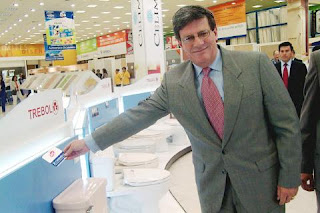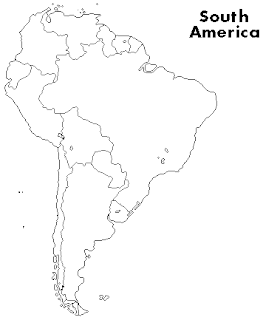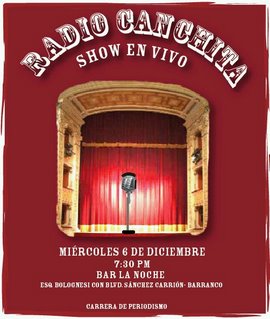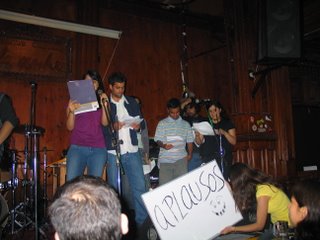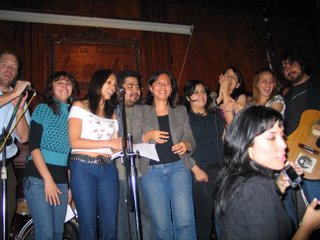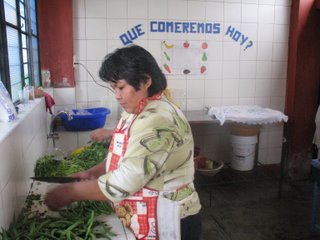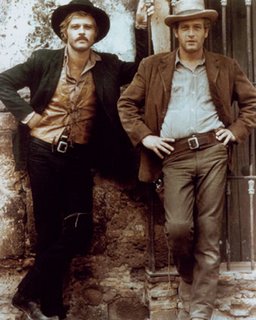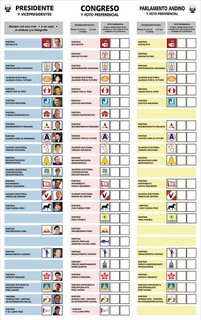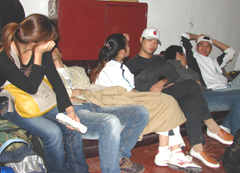 Pena de Muerte
Pena de MuerteAs a radio journalist I have recorded hundreds of events, press conferences and interviews over the years. Many of these audio encounters have faded from my memory. One recording that will stay with me forever is of George Ryan, the former Governor or the US State of Illinois. Governor Ryan was not supposed to be a memorable guy. He was an older heavyset white man with white hair, a former pharmacist, not a particularly gifted speaker, and on the political side he was deeply embroiled in corruption charges. Ryan was hardly the reincarnation of Abraham Lincoln, Illinois’s most famous son. But on an otherwise unremarkable day at a low key gathering of law students at Loyola University, Governor Ryan did something extremely remarkable. He cried. I will never forget that moment. Nobody who was in the room will ever forget that moment.
It is rare that we see such emotion from politicians, especially when it is genuine. Ryan had just announced his intention to commute the sentences of more than a 100 prisoners who were then on Illinois’s death row. A series of investigations had led to the exoneration of more than 15 inmates since Illinois had reinstituted the death penalty in 1977. Ryan said his conscience would not allow him to continue to support a system that was not perfect. Some very high profile cases had ended in death row prisoners being found innocent. Naturally people wondered if innocent people had indeed been executed. “No more,” said Ryan, and he proceeded to follow through on his promise, closing death row and changing the sentences of its more than 150 prisoners to life without parole.
One of the most famous cases that led to Ryan’s decision was that of Anthony Porter, a Chicago native who was sentenced to die for the 1982 shooting deaths of two people on the city’s south side. The United States was caught up in the 80’s in a movement to “Get Tough on Crime.” This led to record numbers of arrests and in big cities like Chicago, widespread abuses by police, politicians, and courts looking to clean up the streets. In Anthony Porter’s case he was a black man involved in gangs in neighborhoods that were notorious for crime. That is to say he was an easy target for a police force looking to make progress on crime. One witness to the double murder was shown a photograph of Porter and threatened by police to testify that Porter was responsible. Porter’s court case was marked by an incompetent lawyer and an unsympathetic judge. He was sentenced to die.
In 1998, 50 hours before Anthony Porter was supposed to be killed, a court reviewed information regarding Porter’s IQ and decided that he lacked the mental competence to understand his pending situation. The court delayed his execution. With this window of opportunity a journalism professor from Chicago’s Northwestern University and some of his students began to review Porter’s case. Professor David Protess’s class investigated the details of the murders and began to follow up on evidence that the Chicago police neglected. This investigation led to the confession of another man to the two murders that Porter was sentenced to die for. Porter was exonerated and immediately released from prison.
As a journalist I must admit this type of investigation is nothing short of remarkable. Professor Protess and his journalism students saved the lives of at least 4 death row inmates over the past decade. Their actions were directly linked to the decision by former Illinois Governor George Ryan to eliminate the death penalty in his state. While I revel in the success of quality journalism and investigation, I am disturbed that it takes college students to do the necessary work to determine culpability. I am disturbed that a negligent system that included cops, politicians, prosecutors, judges and even juries, were responsible for the wrongful convictions of innocent people. I am disturbed that a political desire to appear tough on crime led to human rights abuses and miscarriages of justice.
Can a society control all the variables that make up the good and the bad of daily life? Inevitably societies encounter flaws in their structures. Thankfully many societies realize the benefits of liberal democracies where courts, representatives, and a free press can keep an eye on each other, revealing and correcting deficiencies and mistakes. Even in a high functioning democratic society not all flaws will be caught; at least that is what former Illinois Governor George Ryan decided. Ryan said that he would never feel 100 percent sure that every death row conviction would be justified, and therefore, the system could not be justified.
I am a visiting journalist in Perú teaching future reporters and training those already working in the business. I have watched as rhetoric from Peruvian President Alan Garcia has increased, calling for his Congress and all Peruvians to support his desire to institute a death penalty in Perú. I have watched as the list of those who would be eligible for the death penalty has quickly grown from child rapists to include terrorists. I am waiting for that list to inevitably grow. If there is one thing I can share from the experience of my country, the United States, it is that once you engage the idea that societies can determine who deserves to die, not who deserves to pay for a crime, but who deserves to die, you open up a can of worms.
I was not in Perú during the 1980´s and 1990´s when tens of thousands died. I do not know what that is like and do not propose to understand the pain and suffering that occurred here in Perú. I have had the fortune to work with a group of journalists here in Perú that at one time were jailed as political prisoners. I do not know their complete histories, nor do I know or care about their political leanings. I am simply helping them to become better journalists. To refer to these people as terrorists, which is a common label thrown at them, would be to paint them with a very broad brush. I have never heard an inflammatory or hateful word come from these people. From my observation they are simply trying to piece together lives that were interrupted and forever changed by long jail sentences and in many cases torture. It is especially here that I cringe at the thought of the death penalty in Perú. The possibility that people caught up in a very complicated and violent period of time could yet be sentenced to die for things they may or may not have done. Is Perú ready to let anger and sadness dictate their acceptance of a system that is proven to be flawed, a system that sentences people to die?
Anthony Porter was a gang member during a time in the United States when politicians where using high rates of crime as a way to get elected. Porter was guilty of living in a bad neighborhood during a time when he and most of his peers were in gangs. Did he kill two people? No. Was he sentenced to die? Yes. At the end of the day George Ryan will never be considered the best or brightest politician in the United States, but I believe he was one of the bravest. It is yet to be seen what kind of President Alan Garcia will be. Playing on peoples’ anger, fears and sad memories is a precarious path. If President Garcia is as serious about making the death penalty a solution to terrorism and other crimes, he better be developing the necessary infrastructure that will ensure justice as best as it can be measured in human terms. Even if this is achieved, courts, politicians and most importantly journalists better be ready to take on the task of investigating and doing what they can to make sure the capital punishment system is not killing innocent people. Recent history has taught Peruvians that death can come easy. As a democratic society that should be a warning, not a concept to embrace.






